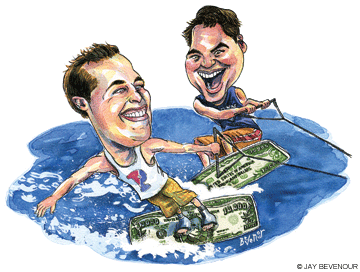
Three and a half years ago, Nat Turner W’08 and Jack Abraham W’08 stood in an off-campus apartment-cum-office crammed with cereal boxes, bargain-bin DVDs, and undone laundry. The summer ahead of them could scarcely have looked sweeter. Each student was the recipient of a $10,000 windfall from Wharton, whose only stipulation was that they work for no boss but themselves.
Turner and Abraham were two of six winners of the inaugural Wharton Venture Award [“Gazetteer,” Sept|Oct 2007], a program aimed at encouraging current students to forgo summer internships and launch their own businesses instead. For the two rising seniors—along with Turner’s partners Zack Weinberg W’08, Scott Becker EAS’08, and Michael Provenzano EAS’08—the cash couldn’t have come at a better time. Google had just bought YouTube, Facebook was opening its site to app-developing entrepreneurs (remember the Scrabble craze?), and it looked as though the Web 2.0 gold rush would be a sport made for 20-year-olds.
“Ten thousand dollars is not an unbelievable amount of money,” Abraham recalled recently. “But it kept the fridge stocked. We were able to buy desks from IKEA, AeroBeds, and pay the rent. We slept in the office. We had this bungee-cord contraption to pull the AeroBeds out of the way during the day.”
And in 2010, it paid the ultimate dividend for both men. This past June, Turner and his cofounders sold their company, Invite Media, to Google for $70 million. Abraham’s company, Milo Inc., was acquired by eBay for $75 million in December.
In a way, it’s fitting that the erstwhile roommates should notch such similar paydays (which they celebrated at year’s end with a reunion in Cabo). Their start-up stories shared many of the same themes and supporting characters. Both tapped the expertise of Wharton lecturer Lawrence Gelburd, who teaches a course on entrepreneurship. Both obtained funding from angel investor Chris Dixon. Each attended the other’s company meetings that first summer, to bounce ideas around and offer another perspective. And both traveled down a dead-end or two that first summer before hitting on a business idea that clicked.
Abraham’s initial hunch was that the worlds of online and offline shopping were soon going to merge, and he thought shoppers would buy a tool that would let them see online prices while they browsed brick-and-mortar stores. He wanted to build something like a smartphone application that would convert a snapshot of a barcode into online price comparisons. But that idea ran up against one of the most unshakeable desires of the American consumer: the need for immediate gratification.
“There was too much inertia in people’s behavior,” Abraham says “Even if they found that something was going to be cheaper online, people didn’t have the fortitude to just put it back on the shelf.”
So there went a bit of time and money down the drain. “Then I thought, what about the other way around? What about using the Internet to drive purchasing in the stores?”
Bridging the divide from the opposite direction turned out to be “a huge point for people,” Abraham says. “They love reading online ratings, and shopping around, but ultimately want to touch it.”
Thus was born Milo, a website designed to help online shoppers locate products in the real world. After two years of entrepreneurial independence, Abraham decided that being swallowed by eBay made sense.
“Our mission,” he says, “was to bring every product on every shelf in every store in the world onto the Internet … When you’re a junior, you’re a little naive, and you think: That’ll be easy! We’ll do it in 6 months! But ultimately it’s really, really hard. It’s going to require a lot of resources and capital, and a bigger platform with bigger reach.” Abraham is now director of eBay’s local commerce division.
Turner and his cofounders went down several blind alleys before finding a profitable path for Invite Media. After setting out to build an online video advertising network for small businesses, they shifted course when Facebook invited outside developers into its virtual real estate.
At first, they tried their hand at building a video-sharing application that would make it easier for Facebook users to show their friends what they were watching; sponsored video ads would provide the revenue.
“But the stupid application only got a couple thousand users,” Turner recalls. “It never went viral.
“So we said, alright, we’re not the best builders of apps. Why don’t we build an analytics platform for these application builders to help them figure out how to make more money?”
But that didn’t really work, either; the app developers they were targeting had already more or less figured out how to optimize revenue on their own.
On the last day of 2007, as Turner remembers it, he and his cofounders got turned on to the world of online advertising exchanges. These had emerged as the model for buying and selling display ads in cyberspace, but they lacked transparency. “Financial markets look pretty efficient. Display advertising did not,” Turner explains. “We said, look, if there’s more than one, then why don’t they have an e-trade system like the financial markets, that makes all the exchanges look like one interface?”
They called it a universal buying platform—a term that would later be supplanted by demand-side platform—and took a leap of faith. “For all of 2008, we built that thing. We had no idea how to market it, we had no idea who would use it, but that was the tech we were building. Then, in early 2009, something happened. All these agencies starting calling us wanting to use this technology.”
Google acquired their company “three years on the dot” after they’d started that summer of the Wharton Venture Award. Turner and Weinberg have stayed on board.
Looking back, Turner and Abraham both credit that $10,000 stipend with defraying the opportunity cost that inevitably accompanies entrepreneurship.
“You really have to put yourself in the shoes of a junior in college,” says Abraham. “All your friends are getting internships at all of these great places. And they’re getting paid $10,000 or $20,000 for a summer. That’s an unbelievable amount of money to make in a summer! And they get to go to New York or California. But if you decided to be an entrepreneur, you don’t get any of that. You’re actually risking money.”
Both men remain fervent supporters of the entrepreneurial programs at their alma mater. Abraham participated in Wharton’s Entrepreneur-in-Residence program in February. Turner expects to do the same in the future, and has been back to campus to speak at a management class and interact with students.
“I’m a huge supporter of trying to get students—especially freshmen and sophomores—to have their eyes open to entrepreneurship before they get lured in by banks and consulting firms,” Turner says. “When you’re young, you have a huge opportunity to do something you can’t do when you’re older … When you’re a student, your parents are still paying your housing, you probably have a credit card from them, you have all these resources at your fingertips. People are willing to meet with you because you’re a student.”
Abraham echoes that sentiment, saying that he and Turner spent some of that first summer cold-calling other entrepreneurs and investors for advice, sometimes literally guessing at email addresses. “When you’re graduated, everybody thinks you’re just asking for money. But when you’re a student, they remember when they were students, and they don’t think you’re just trying to extract value from them.”
According to Emily Cieri, the managing director of Wharton Entrepreneurial Programs, Abraham and Turner are the first Wharton Venture Award winners to exit the venture-capital stage in such a lucrative fashion, but many of the others are still in the hunt. “We’ve granted 18 awards,” she says, “and just over 75 percent of them are still in operation.” The businesses range from Warby Parker, an online eyeglasses vendor co-founded by WVA winner Jeffrey Raider WG’10, to Angiologix Inc., a medical diagnostic device company started by Masha Merchant WG’08.
Somehow, though, it seems unlikely that any of the others can trace their companies’ origins to a crash pad with the funk factor of Turner’s and Abraham’s.
“That was one of the best years of my life, for sure,” Turner says. “Yeah, we had the bungee cords with the beds. I was sleeping under the conference table on an AeroBed. I didn’t go home for four months at one point. The air-conditioning never worked—we had to buy this huge AC unit from Home Depot and set it up. We had the window open because there was this huge exhaust pipe. And the Internet was bad! It was the classic start-up space.” —T.P.




